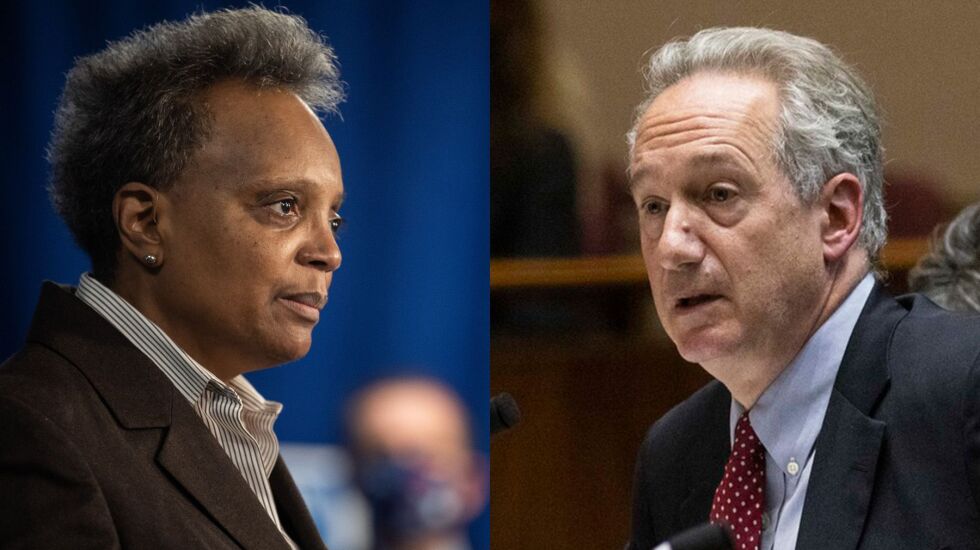
Lori Lightfoot owes her election to the corruption scandal still swirling around indicted Ald. Edward Burke (14th), but she has not been the reform mayor she promised to be.
That’s the no-holds-barred assessment from former Inspector General Joe Ferguson. His 12-year run as Chicago’s top watchdog ended last fall when he resigned to avoid being pushed out by Lightfoot, who had frozen him out, repeatedly criticized him and made it clear she had no intention of reappointing him.
Now, the shoe is on the other foot.
Lightfoot is campaigning for reelection and Ferguson is on the sidelines poking holes in the mayor’s record for delivering the reform and transparency she promised under the campaign slogan, “Bring in the light.”
It might sound like sour grapes from a man who was pushed out. But it’s deeper than that.
Ferguson truly believes that “relative to the rhetoric of the campaign, certainly performance has not lived up to” what she promised. And he has a bill of particulars to explain why.
For example, Lightfoot campaigned on a promise to empower the inspector general to investigate other agencies of local government.
But “nothing remotely like that was done and quite the contrary,” Ferguson said — even after her closest allies cried out for those expanded powers after the long-languishing lifeguard scandal at the Chicago Park District first disclosed by WBEZ-FM.
“Far from recognizing that as a moment and an opportunity to say, `This is exactly what I, as a candidate, was noting about the problems of balkanized oversight’ — in a moment when her ally, Scott Waguespack, said the city IG really should be stepping into this ’cause something is way wrong here’ — she circled the wagons …. She went in the complete other direction,” Ferguson told the Chicago Sun-Times.
“What that’s about, I can only ... broadly surmise. ... Which is, the lens is now on her and she would prefer that lens not be sharp and not be effective.”
Ferguson also pointed to how long it took for Lightfoot to choose his top deputy, Deborah Witzburg, as his replacement and how hard she tried to avoid choosing the deputy IG for public safety.
“The months of delay were unforgivable. … Deborah’s name was provided to the mayor in December of last year. And we had to wait months because the committee was asked to go back to the well and do another search, which signaled maybe she didn’t want to appoint Deborah,” Ferguson said.
“But, at the end of the day, Deborah is a wonderful choice and the mayor made that choice. So, the mayor gets credit for that.”
Before the search began, Lightfoot raised eyebrows by saying she was looking for a successor to Ferguson who “understood the importance of staying in their lane.”
“When you’re driving 20 miles over the speed limit or you’re changing lanes wildly without signaling and the police pull up behind you, put on the lights and tell you to pull over, the response is not, ‘Hey, this is my lane. Stay in your own lane.’ You pull over. That’s kind of what IGs do,” he said.
Ferguson is a former federal prosecutor who served with Lightfoot in the U.S. attorney’s office.
When he was appointed by former Mayor Richard M. Daley in 2009 to replace departing Inspector General David Hoffman, Lightfoot was among those who vouched for and recommended her friend Ferguson.
That close relationship initially raised questions about just how independent Ferguson would be in a Lightfoot administration.
How they came to be adversaries remains a mystery to Ferguson, primarily because he was frozen out.
His only meeting with Lightfoot was after her landslide victory in the 2019 runoff and before she was sworn in as mayor.
“Rahm Emanuel [and] Rich Daley, we met quarterly … whether times were good or times were bad,” Ferguson said. “...Things that I was seeing that we weren’t gonna be able to actually investigate or audit. And they would express things that were of concern to them without any sort of direction or order to me. They identified and put on the table things where they were concerned and said would benefit from an independent examination. None of that happened with Lori.”
Ferguson spent two years in a cold war with Emanuel. Their legal battle over access to documents went all the way to the Illinois Supreme Court.
But after an Ohio bribery scandal culminated in the conviction of former City Comptroller Amer Ahmad, Emanuel did an abrupt about-face. He twice re-appointed the watchdog he called “the devil I know” and expanded Ferguson’s powers and budget exponentially.
“I’ve always gotten criticism for saying anything nice about Rahm Emanuel. But the fact of the matter is … Rahm actually did a heckuva a lot to enhance the powers of the inspector general. The first couple of years, we did not get along. ... But he faced a corruption crisis and, suddenly, the switch went off,” Ferguson said.
“It’s a challenge to embrace oversight. Sometimes IGs are like going to the dentist. Sometimes, they’re like going to the proctologist. But that’s part of what makes us better.”
Earlier this year, Lightfoot criticized Ferguson for his surprise decision to write a letter to U.S. senators considering the appointment of Emanuel as U.S. ambassador to Japan emphatically stating there is no evidence that Emanuel covered up the police shooting of Laquan McDonald.
“I thought it was pretty extraordinary. Why would an inspector general who, supposedly is independent, be vouching for anyone particularly in that context,” Lightfoot said on that day.
“I thought it was, frankly, beyond the pale. ... Supposedly he wrote the letter days after the end of his tenure. But still. I just thought that was a pretty extraordinary thing for him to do because he was offering, in effect, an exoneration of the mayor’s conduct.”







